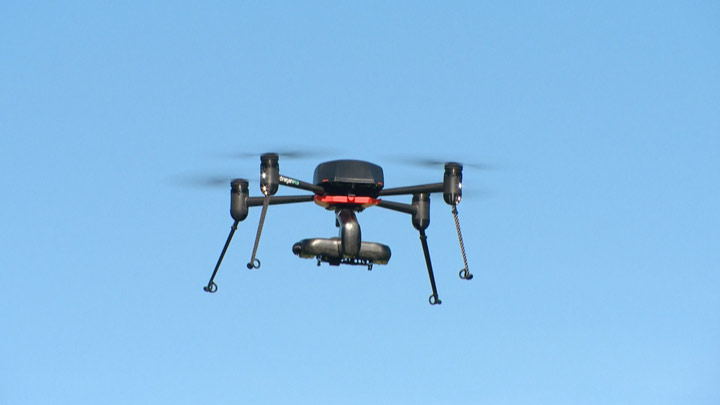Police in Quebec are reminding people to think twice about the rules and regulations before buying a drone.

READ MORE: Canada’s drone racing king doubles as McGill PhD candidate
“We want to tell the population that, with Christmas coming over, that it’s still a machine that is quite popular,” said Laval police spokesperson Evelyne Boudreau.
“If you do not have the proper permits, there’s no where you can really fly a drone. You have to know the regulations when you buy one.”
The reminder comes after a drone was found on the roof of a home in Chomedey, Que. last July.
WATCH BELOW: Meet Canada’s drone racing king

Police believe the device’s battery ran out. A photograph of the owner holding a controller was extracted from the drone’s memory card.
Boudreau noted that nothing dangerous or criminal was found on the device, but officers are meeting with the man to make sure he has his full permits.

Get breaking National news
READ MORE: Apps, drones and new machinery — A look at Montreal’s game plan to tackle snow and ice this winter
“They have to know there are a lot of different regulations,” Boudreau told Global News.
“There are no fly zones because of the airports and you can’t fly over autoroutes.”
If a drone is caught flying without permits, the owner can face fines of up to $3,000.
Flying a drone safely and legally
There are certain rules to flying a drone recreationally in Canada.
WATCH ABOVE: Ralph Goodale on the ‘threat consequences’ raised by drone technology

If you fly a drone for fun that weighs 35 kg or less, you do not need special permission from Transport Canada.
If it is heavier, you must get a special flight operations certificate.
You must fly your drone:
- below 90 m above the ground
- at least 30 m away from populated areas (if the drone weighs between 250 g and 1 kg)
- at least 76 m away from populated areas (if the drone weighs between 1 kg and 35 kg)
- at least 5.6 km away from aerodromes (airports, seaplane bases or places where aircraft take off and land)
- at least 1.9 km away from heliports or helicopter aerodromes
- away of controlled or restricted airspace
- away from border crossings
- at least 9 km away from a natural hazard or disaster area
- away from places where it could interfere with police or first responders
According to Transport Canada, drones should be flown in daylight during good weather.
READ MORE: 2 arrested in Denmark on suspicion of buying drones for ISIS
“Keep your drone where you can see it with your own eyes — not through an on-board camera, monitor or smartphone,” it states.
“Respect the privacy of others — do not fly over private property or take photos or videos without permission.”
The device must be clearly marked with your name, address and telephone number.
WATCH BELOW: Drone racing in Steinbach



Comments
Want to discuss? Please read our Commenting Policy first.